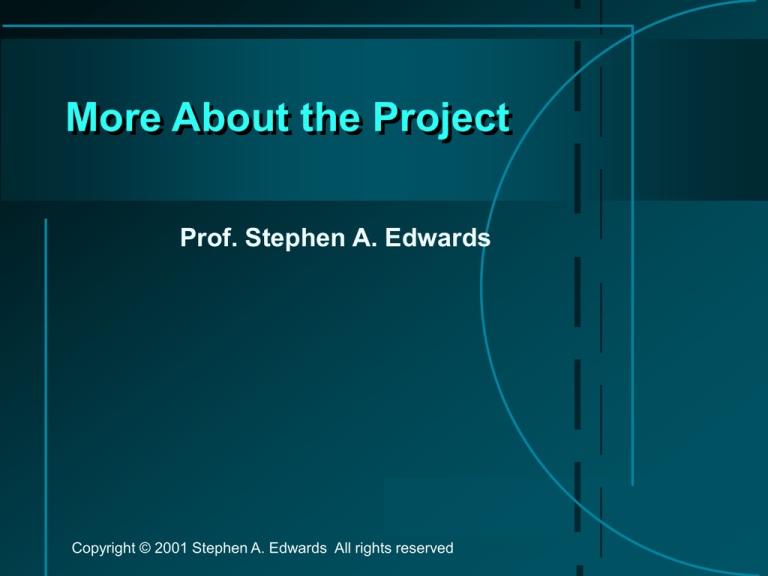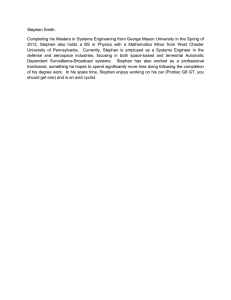
More About the Project
Prof. Stephen A. Edwards
Copyright © 2001 Stephen A. Edwards All rights reserved
Goal of the Project
Lecture and homework can’t go into depth with any
one language
I want to give you a more intimate experience with at
least one of the languages
You’ll have to explore the literature and do
independent research
Lecture and homework more theoretical; project will
apply that theory
I’m hoping to promote your research
I’m hoping to promote my research
Copyright © 2001 Stephen A. Edwards All rights reserved
Project Rules
One-paragraph project proposal due September 24
Literature survey presentations October 29
Literature survey due October 31
Project presentations December 3 & 5
Project writeup due December 10
Multiple teams may choose the same project
Copyright © 2001 Stephen A. Edwards All rights reserved
Project Ideas
Hierarchy browser for the Verilog language
•
•
•
•
Verilog models hardware
Systems contain modules with instances of others
Project: Use an existing parser, extract connectivity
information, display it attractively
Prerequisites: Understand the Verilog language (use
the text), understand a freely-available parser
Compiled event-driven simulator for Esterel
•
•
•
Event-driven simulation divides behavior into events
(e.g., change this wire’s value) and schedules them in
an event queue
Project: Apply this to (part of) Esterel
Prerequisites: Understand Esterel, understand my
compiler for it
Copyright © 2001 Stephen A. Edwards All rights reserved
Project Ideas
Compare Verilog and SystemC
•
•
•
Both are able to model hardware, but which is better
Project: Pick some example (e.g., a processor cache
controller) and implement it in both
Prerequisites: Some hardware design knowledge,
understand both languages
An Environment for Kahn Process Networks
•
•
•
Kahn proposed a C-like language with “send” and
“receive” statements
Project: Create a library that allows you to run these
systems (Java? C?) Main challenge: scheduler.
Prerequisites: Understand the Kahn model, decent lowlevel programming skills
Copyright © 2001 Stephen A. Edwards All rights reserved
Project Ideas
Develop a simulator for an assembly language
•
•
•
Compare the many approaches (interpreter-based,
object-to-object translation); pick one to implement
Project: Build the simulator in C or Java
Prerequisites: Intimate knowledge of one assembly
language
A survey of language concurrency models
•
•
Compare how Java, POSIX threads, Ada, Verilog, etc.
handle concurrency
Prerequisites: understand the concurrency models of
each of these languages. Read some language
reference manuals
Copyright © 2001 Stephen A. Edwards All rights reserved
Project Ideas
Create a simplified Verilog simulator
•
•
•
Take an existing front-end and create a new back-end
Try to make it faster
Prerequisites: some knowledge of digital design, indepth understanding of Verilog (read text, papers)
Compare performance of Linux and an RTOS
•
•
•
Figuring out how to measure this is the challenge
Read some of the OS literature to figure this out
Prerequisites: detailed OS knowledge
Copyright © 2001 Stephen A. Edwards All rights reserved
Project Ideas (My Favorites)
Propose a language for device drivers
•
•
•
•
Start from French group’s work on video drivers
Look for patterns in existing, handwritten drivers
Propose a simple language capturing these patterns
Write a simple compiler (perhaps using m4)
Propose a language for communication protocols
•
•
•
•
Use some of the others as starting points
Discuss their advantages and disadvantages
Propose extensions, simplifications, others
Consider different compilation techniques
Copyright © 2001 Stephen A. Edwards All rights reserved
Project Ideas
Software Estimation
•
•
•
Read up on the software performance estimation
literature
Either use some existing tools or develop a new one
Compare different approaches. How accurate are they?
Copyright © 2001 Stephen A. Edwards All rights reserved
Example Project
Implementing Process Networks in Java
Arnab Basu and Hampapur P. Vijay Kishen, 2000
Done at UT Austin in Brian Evans’ class
Used Parks’ scheduling algorithm to resolve
deadlocks
Writeup (from Brian’s class site):
•
•
•
•
Survey of different process networks
Description of other, similar projects
Description of their implementation
Experiments compare various scheduling policies
Copyright © 2001 Stephen A. Edwards All rights reserved



